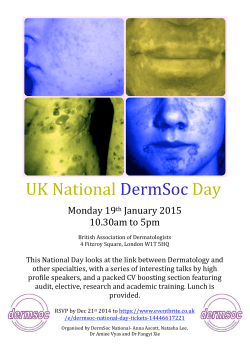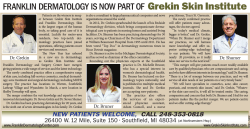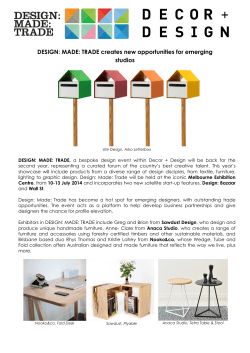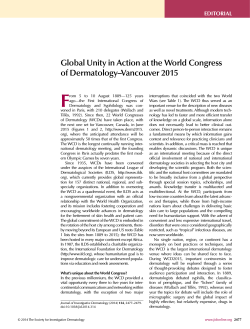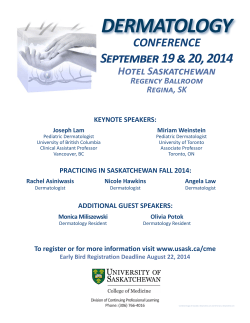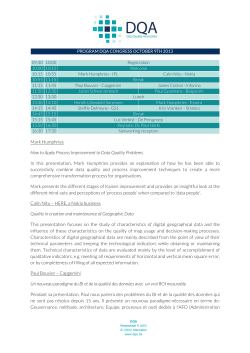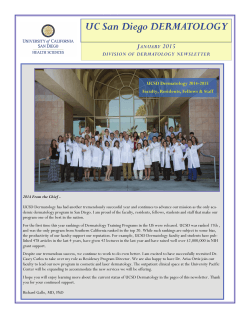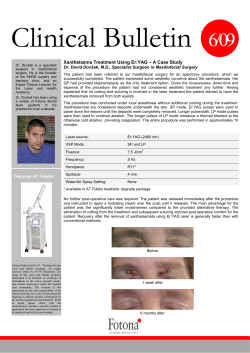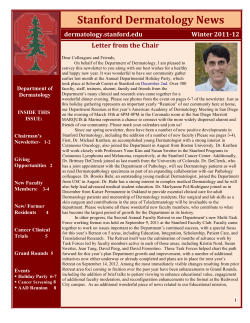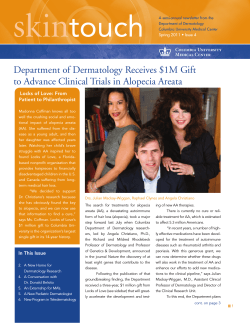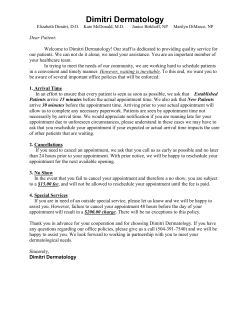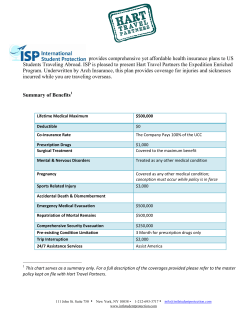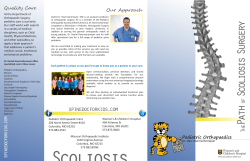
melasma treatment ❚ with lasers & lights
❚ ❚ ❚ ❚ DNA Repair Practice Management Fine Lines & Wrinkles Patient Wellbeing Industry News ❙ ❙ September 2013 Volume 3 Issue 6 September 2013 Volume 3 Issue 6 INTERNATIONAL JOURNAL OF AESTHETIC AND ANTI-AGEING MEDICINE ❙ INTERNATIONAL JOURNAL OF AESTHETIC AND ANTI-AGEING MEDICINE Stromal enriched lipograft technique and benefits Mentoplasty with alloplastic implants Mini-lift blepharoplasty avoiding complications prime-journal.com melasma treatment with lasers & lights | GUEST EDITORIAL International Journal of Aesthetic and Anti-Ageing Medicine 119 Farringdon Road, London, EC1R 3DA, UK www.informahealthcare.com ISSN 2159-8908 (print) ISSN 2159-8916 (online) Managing Editor Rosalind Hill rosalind.hill@informa.com Sub-Editor Balraj Juttla balraj.juttla@informa.com Publisher Mark Eaton mark.eaton@informa.com / +44(0)20 7017 4060 European Sales Manager Mat Eaton mat.eaton@informa.com / +44(0)20 7017 4315 Business Development Manager NA Meg McNeel meg.mcneel@informausa.com / +1 (212) 520 2745 Marketing Manager Jonathan Lissemore jonathan.lissemore@informa.com Marketing Director Justin Bambridge justin.bambridge@informa.com Production Manager Jonathan Collard jonathan.collard@informa.com Graphic Designer Snehal Sanghani snehal.sanghani@informa.com Director of Audience Development Nora Pastenkos nora.pastenkos@informausa.com Managing Director James Gareh james.gareh@informa.com Art Director David ‘Spike’ McCormack spike@spikedesigns.co.uk Production & Ads Department primeadverts@informa.com Please send your manuscripts and press releases to: rosalind.hill@informa.com All submitted manuscripts are evaluated on the basis of scientific quality, originality, appropriateness, contribution to the field and style. Suitable manuscripts are subject to peer-review. Manuscripts and accompanying files should be prepared in accordance with our Author Guidelines, which are available via www.prime-journal.com. All content © 2013 Informa UK Ltd Images © Shutterstock.com, unless otherwise stated For address changes, please contact Nora Pastenkos: nora.pastenkos@informausa.com W HY HAVE AESTHETIC TREATMENTS BECOME MORE POPULAR THAN ever? Despite the economic crisis? Despite the bad examples featured in the press every day? For an answer, we must look to our patients, as without them the whole story would not exist. Despite the economic climate in Europe, aesthetic treatments are more popular than ever. Leonard Lauder, Chairman of the Board of Estée Lauder, saw the emergence of this phenomena and looking at his industry during the early 2000s, coined the phrase ‘lipstick index’, claiming that ‘lipstick sales could be an economic indicator, in that purchases of cosmetics — lipsticks in particular — tend to inversely correlate to economic health’. Being a dermatologist practicing both medical dermatology and aesthetic dermatology for many years now, I have been aware of this trend myself: the wish and desire to look and feel good is crisis resistant. Looking at the medical aesthetic market, the ‘little’ difference here simply and notably is, that an aesthetic treatment can’t and certainly shouldn’t be ‘shopped’. Patients — and I call them patients rather than clients or consumers — don’t necessarily want to look much younger, but rather refreshed, relaxed, and natural. They want to simply look better, not to change much, but are looking for discreet results instead. This is certainly a different challenge for doctors in Europe having a largely Caucasian patient base compared with patients of Asian descent. The aesthetic toolbox of the medical doctor is huge. From my perspective, non- and microinvasive interventions are still the most popular choices. The challenge here is a balancing act between effectiveness and a low downtime profile. The most important duty of any doctor is, and must be, to reliably and knowledgeably consult with the patient to find ‘the point of change’ in every patient. The point which would make the optimal improvement once fixed. The mainstays in the physician’s armamentarium are still well approved and researched therapies such as botulinum toxin and fillers. However, I am also very keen to look at new products and new technologies at a basic and clinical research level, as I understand that they may make it to the market in the future, as the ‘work horses’ of today — toxins and fillers — did in the past. Unfortunately, quite a few technologies are thrown to the market too quickly, and in an immature state. A technology may sound intelligent, but the outcomes, complexity of procedures, and downtime profile may not match the needs or expectations of patients and physicians. I am a great believer in simple, easy, and cost-effective treatments, such as individually designed chemical peels. Ultimately — and this is what makes me tick — all of these considerations and concerns relate back to patient safety. The most important factors in the aesthetic field are training and medical education. Furthermore, physicians must have or develop the ability to determine the right treatment choices for patients. In other words, we must distinguish the good therapies from the bad. It’s all about customising our treatments and finding the appropriate one for the patient. As long as we try to handle the aesthetic concerns of our patients around the world accordingly, one does not have to feel shy about accepting a little help to turn back the clock! Sabine Zenker, MD Dermatologist, Germany PRIME JOURNAL EDITORIAL BOARD BOARD MEMBER SPECIALISM COUNTRY BOARD MEMBER Dr Claude Dalle Dr Wilmar Accursio Dr Ashraf Badawi Dr Janethy Balakrishnan Dr Lakhdar Belhaouari Dr Anthony Benedetto Dr Philippe Berros Dr Dario Bertossi Dr Pierre Bouhanna Dr Fahd Benslimane Prof Wayne Carey Dr Claude Chauchard Dr Christophe de Jaeger Dr Jacques Dequesne Prof Ilaria Ghersetich Dr Kate Goldie Dr Monika Golkova Prof Eckart Haneke Dr Steven Hopping Prof Andreas Katsambas Dr Mario Krause Dr David Lai Dr Marina Landau Anti-ageing & aesth. medicine Endocrinology Dermatology Aesthetic & anti-ageing medicine Plastic surgery Cosmetic Dermatology Oculoplastic surgery Maxillofacial surgery Dermatology – Hair surgery Plastic Surgery Dermatology Anti-ageing medicine Geriatrics Gynaecology Dermatology Aesthetic Physician Neurology Dermatology Plastic surgery Dermatology Anti-ageing medicine Anti-ageing medicine Dermatology France Brazil Egypt & Canada Malaysia France USA Monaco Italy France Morocco Canada France France France Italy UK Czech Republic Germany USA Greece Germany Hong Kong Israel Dr Gustavo Leibaschoff Cosmetic Surgery Dr Sohail Mansoor Dermatology Prof Leonardo Marini Dermatology Dr Sly Nedic Aesthetic & anti-ageing medicine Prof Dr Martino Neumann Dermatology & Venereology Prof Daniel Pella Cardiology Dr Chariya Petchngaovilai Dermatology Prof Ascanio Polimeni Neuro-endocrinology Dr Herve Raspaldo Facial plastic surgery Dr Christopher Rowland-PayneDermatology Dr Neil Sadick Dermatology Dr Hema Sundaram Dermatology Dr Pakpilai Thavisin Dermatology & Anti-ageing medicine Dr Patrick Treacy Aesthetic surgery Dr Mario Trelles Plastic surgery Dr Ines Verner Dermatology Dr Octavio Viera Anti-ageing medicine Dr Jean-Luc Vigneron Aesthetic dermatology Prof Bernard Weber Genetics Dr Sabine Zenker Dermatology Catherine Decuyper Industry expert & consultant Wendy Lewis Industry expert Christophe Luino Industry expert & consultant SPECIALISM COUNTRY USA UK Italy South Africa Netherlands Slovakia Thailand Italy France UK USA USA Thailand Ireland Spain Israel Spain France Luxembourg Germany France USA France prime-journal.com | September 2013 5
© Copyright 2025
